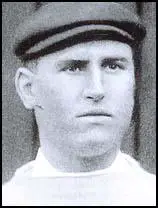Jack Hillman

Jack Hillman was born in Tavistock, Devon on 30th October 1871. His family moved to Burnley when he was a child. He played local football before signing for Burnley in 1890.
Hillman made his debut for the first-team in 1891. He was a great success and the goalkeeper only missed six league games over the next four years. As Mike Jackman pointed out in The Legends of Burnley, Hillman was "one of the great exponents of goalkeeping during the Victorian period."
In February 1895, he was transferred to Everton for £200. He only missed one game that season and helped his new club to finish in 3rd place in the First Division of the Football League.
In 1897 Hillman was sold to Dundee. However, he had difficulty settling in Scotland and he was suspended by his employers after being accused of not trying hard enough during games. Ernest Mangnall, the manager of Burnley, helped Hillman escape from the Scottish League by paying £225 for his services.
Hillman's form was so good that he was selected to play for England against Northern Ireland on 18th February 1899. England won 13-2. However, Burnley struggled in the First Division of the Football League. Unless the team beat Nottingham Forest on the final day of the season, they would be relegated. Burnley lost 4-0. After the game, the Nottingham Forest captain, Archie McPherson, claimed that Hillman had tried to bribe his team to lose the game.
Hillman was called to appear before the Football Association. The FA refused to believe Hillman's claim that he was only joking and he was banned from football for 12 months. He not only lost a year's wages but a £300 benefit.
Hillman returned to the Burnley team for the 1901-02 season. However, he had to been forgiven by the FA and he never won another international cap. In January 1902 Manchester City signed Hillman. He helped City win promotion to the First Division and won a FA Cup-winners' medal in 1903-04.
Manchester City also did well in the 1904-05 season. City needed to beat Aston Villa on the final day of the season to win the championship. Villa won the game 3-1 and City finished third, two points behind Newcastle United. After the game Alec Leake, the captain of Aston Villa, claimed that Billy Meredith had offered him £10 to throw the game. Meredith was found guilty of this offence by the Football Association and was fined and suspended from playing football for a year.
Manchester City refused to provide financial help for Meredith and so he decided to go public about what really was going on at the club: "What was the secret of the success of the Manchester City team? In my opinion, the fact that the club put aside the rule that no player should receive more than four pounds a week... The team delivered the goods, the club paid for the goods delivered and both sides were satisfied." This statement created a sensation as the FA had imposed a £4 a week maximum wage on all clubs in 1901.
The Football Association now carried out an investigation into the financial activities of Manchester City. They discovered that City had been making additional payments to all their players. Tom Maley was suspended from football for life and City was fined £250. Seventeen players were fined and suspended until January 1907. This included Jack Hillman.
Manchester City was also forced to sell their players and at an auction at the Queen's Hotel in Manchester. The Manchester United manager, Ernest Mangnal signed the outstandingly gifted, Billy Meredith for only £500. Mangnal also purchased three other talented members of the City side, Herbert Burgess, Sandy Turnbull and Jimmy Bannister. Hillman, who was now 36 years old, was sold to Millwall in the Southern League.
In 1908 Hillman retired from football and returned to Burnley to run his confectionery shop. He also did some football coaching.
Jack Hillman died in Burnley on 1st August 1955.
